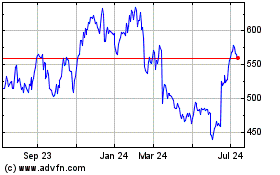Media Alert: Adobe Advances Strategic Partnership With Microsoft Around CRM and Content Management
November 03 2017 - 9:00AM
Business Wire
New Integrations Across Adobe Experience Cloud and Microsoft
Dynamics 365 Advance Sales and Marketing Operations
Adobe (Nasdaq:ADBE) unveiled today, with Microsoft, the next
milestone in their strategic partnership announced in September
2016. Adobe Experience Manager, Adobe’s industry-leading content
management solution in Adobe Marketing Cloud, part of Adobe
Experience Cloud, is now integrated with Microsoft Dynamics 365,
which provides universal web standards and extensibility. Available
to joint customers today, the integration helps brands optimize
enterprise selling and lead management.
“For well over a year, engineering teams across Adobe and
Microsoft have been working closely together and making available
to joint customers a number of integrations that drive business
value,” said Suresh Vittal, vice president, Experience Cloud
Strategy at Adobe. “By empowering enterprise companies to design
and connect rich content with vast amounts of data – including
customer relationship management (CRM) data from Microsoft Dynamics
365 – Adobe and Microsoft are uniquely positioned to transform how
sales and marketing organizations engage with customers.”
“As our collaboration with Adobe continues to gain momentum, we
offer brands the unparalleled ability to leverage Adobe’s
leadership in delivering amazing customer experiences, coupled with
Microsoft’s success in CRM,” said Alysa Taylor, general manager,
Business Applications Group at Microsoft. “Integration of Microsoft
Dynamics 365 with Adobe Experience Manager takes this a step
further, bringing hyper-personalized engagement that can help drive
sales.”
Adobe Experience Manager integration with CRM data from
Microsoft Dynamics 365 enables enterprise marketers to deliver
one-to-one personalization of web content at massive scale and
connect any lead generation data input on the web to their CRM
system. Consulting firms and system integrators like EY can
leverage Adobe Experience Manager’s open platform APIs to drive
innovation like connecting digital assets with CRM data to
accelerate the sourcing, management and delivery of personalized
brand assets across customer touch points. Brands can also
intelligently collect lead generation data online and pre-populate
online forms with CRM data to more effectively drive
conversions.
"We’re increasingly seeing the need for salespeople to become
better marketers as the role of marketing in the sales cycle
continues to grow. The partnership between Adobe and Microsoft
reinforces this need, and is transforming how organizations will
market, sell and deliver value to customers,” said Greg Jenko,
principal, Americas lead for Digital and Analytics, EY. “We’ve
built a B2B sales model leveraging Adobe and Microsoft’s joint
offering, focused on driving conversions and true digital
transformation for our clients.”
Over 150 trillion customer data transactions and 41 trillion
rich media requests flow through Adobe Experience Cloud annually.
The tight integration of marketing with Dynamics 365 customer data
provides joint customers with a complete view of their customers at
every interaction. For example, if someone searches for a gym
membership, the brand can intelligently customize its landing page,
mobile app, chatbot and all other engagement to be focused on her
activity of interest, such as yoga. This level of personalization
helps increase the individual’s engagement through a more seamless
interaction, with a high likelihood for her to convert to become a
customer.
Adobe Experience Manager’s integration with Dynamics 365 expands
on existing Adobe and Microsoft technology integrations
including:
- Integration of Adobe Campaign, part of
Adobe Marketing Cloud, with Microsoft Dynamics 365 to inform
customer engagements with cross-channel campaigns.
- Microsoft is leveraging Adobe Audience
Manager, part of Adobe Analytics Cloud, for custom audience
targeting on Microsoft Bing. By uploading data via Adobe’s data
management platform, brands benefit from improved ad
targeting.
- Through the integration of Adobe
Analytics Cloud’s voice analytics capabilities with Microsoft
Cortana, brands can capture and analyze voice data, such as user
intent and frequency of use.
- Adobe Campaign, Adobe Experience
Manager and Adobe Audience Manager run on Microsoft Azure to
deliver its cloud services.
- Nearly 50 enterprise companies across
all major verticals, such as retail, travel, financial services and
public sector, leverage Adobe and Microsoft’s joint offerings.
Joint customers include Air Canada, Avianca, Great West Life
Assurance, Monoprice and W.B. Mason, among others.
About Adobe Experience Cloud
Adobe Experience Cloud is a comprehensive set of cloud services
designed to give enterprises everything needed to deliver
exceptional customer experiences. Comprised of Adobe Marketing
Cloud, Adobe Advertising Cloud and Adobe Analytics Cloud,
Experience Cloud is built on the Adobe Cloud Platform and
integrated with Adobe Creative Cloud and Document Cloud. Leveraging
Adobe Sensei’s machine learning and artificial intelligence
capabilities, Adobe Experience Cloud combines world-class
solutions, a complete extensive platform, comprehensive data and
content systems, and a robust partner ecosystem that offer an
unmatched expertise in experience delivery.
About Adobe
Adobe is changing the world through digital experiences. For
more information, visit www.adobe.com.
© 2017 Adobe Systems Incorporated. All rights reserved. Adobe
and the Adobe logo are either registered trademarks or trademarks
of Adobe Systems Incorporated in the United States and/or other
countries. All other trademarks are the property of their
respective owners.
View source
version on businesswire.com: http://www.businesswire.com/news/home/20171103005253/en/
AdobeMelissa Chanslor,
415-832-5489chanslor@adobe.comorAdobeStefan Offermann,
408-536-4023sofferma@adobe.com
Adobe (NASDAQ:ADBE)
Historical Stock Chart
From Mar 2024 to Apr 2024

Adobe (NASDAQ:ADBE)
Historical Stock Chart
From Apr 2023 to Apr 2024
